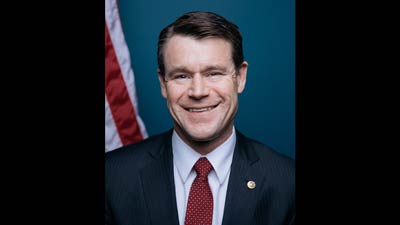Senator Dan Coats announced today that he will not seek re-election in 2016, creating a mad scramble among potential candidates for a seat that could determine which party controls the United States Senate.
“This was not an easy decision,” Coats said, arguing that he was well-positioned to win but ultimately “concluded that the time has come to pass this demanding job to the next generation of leaders.”
“I am grateful to God and to Hoosiers who allowed me to serve my state and my country. I am particularly thankful for the unqualified support of my wife Marsha and our family. Regarding this decision, they were 100 percent in favor of whatever choice I would make,” Coats said.
Coats served in the United States House of Representatives from 1981 until 1990 when he was elected to the Senate in a special election to replace Dan Quayle, who was elected vice president in 1988. Coats was elected to a full term in 1992. He retired from the Senate in 1998 but ran again in 2010 after former Senator Evan Bayh decided against running for a third term.
Bayh — the popular former two-term Indiana governor who replaced Coats in the Senate after his retirement in 1998 — is a possible candidate on the Democratic side to replace the outgoing senator.
“I’m not running for any office, and I have no interest at this point in running for any office,” Bayh told Politico in an interview last week.
The “no interest at this point” sparked speculation that the former senator could be open to the idea of launching a campaign to reclaim his former seat in the Upper Chamber. Bayh is sitting on a $10 million war chest that would immediately give him a huge cash advantage over any potential rivals.
Should Bayh decline to run, the race could still remain competitive.
However, Indiana’s bench of possible Democratic contenders is thin. Representatives Andre Carson of Indianapolis and Pete Visclosky of northwestern Indiana are the only Democrats representing Indiana in Congress. Neither seem particularly likely to mount a statewide Senate bid when they currently sit in safe House seats.
A more likely candidate is former Congressman Baron Hill, who represented southern Indiana for all but two years between 1999 and 2011. Hill is also considering a challenge to Governor Mike Pence.
Republicans will likely have a wide open field with potentially several sitting members of the House running for the Senate seat, including Representatives Jackie Walorski and Marlin Stutzman.
Coats defeated Stutzman in the 2010 Republican primary for the US Senate but Stutzman — who ran to Coats’ right — placed second.
“We will be taking a serious look at running again,” Stutzman told Politico.
The stakes are high: Indiana is now a prime Democratic target in their bid to recapture control of the United States Senate, which they lost in the 2014 midterms.
The party has mostly focused its efforts on unseating incumbents in Democratic-leaning states like Illinois, Pennsylvania and Wisconsin.
The Coats retirement creates a new opportunity in a Senate map that Democrats hope to expand into red states like Indiana, which lean Republican but are open to electing Democrats.
Despite setbacks from gerrymandering and other disadvantages in the US House, Democrats have been competitive on a statewide level in Indiana.
President Barack Obama won the state in the 2008 presidential election, Joe Donnelly in the 2012 US Senate race, and Glenda Ritz in the 2012 race for State Superintendent.
Democrats will need to net at least four seats and retain control of the presidency (or five seats without holding the White House) in 2016 if they want to win back the US Senate.
Image Credit: Bread for the World, flickr










